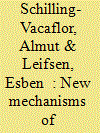| Srl | Item |
| 1 |
ID:
152782


|
|
|
|
|
| Summary/Abstract |
The last environmental impact assessment (EIA) related to Ecuador’s first large-scale open pit copper mine, the Mirador project, was presented to the public in March 2015. In this article, we discuss how the rural mestizo population and Shuar indigenous people, who are under increasing pressure from the government and the mining company, contest the current politics of accountability related to the making and dissemination of this EIA. We analyse how formal instruments of governance related to participation (prior consultation) and environmental management (environmental impact monitoring), are re-used in the affected population’s resistance work. We look at how these formal instruments are put to independent and political use as part of an extended struggle for influence over the process of transformation that the mega mining project generates. The article contributes to a discussion around participatory strategies that build on new conversations between ‘popular environmentalists’ and social/earth scientists.
|
|
|
|
|
|
|
|
|
|
|
|
|
|
|
|
| 2 |
ID:
152779


|
|
|
|
|
| Summary/Abstract |
In this special issue, the focus is on the dynamics and use of participatory mechanisms related to the rapid expansion of the extractive industries worldwide and the ways it increasingly affects sensitive natural environments populated by indigenous and other marginalised populations. We offer an empirically grounded and theoretically innovative comparative analysis of practices that aim to enhance participation, negotiation and influence as a response to the expansion of extractive industries. On the one hand, we question the assumption often presented in scholarly debates that participatory processes will contribute to making environmental governance not only more legitimate and effective, but will also lead to the empowerment of marginalised social groups. On the other, we draw on our empirical studies and insights to indicate ways local groups and their allies try to gain ownership and influence decision-making through a range of related participatory mechanisms, ranging from state-led or corporation-led processes like prior consultation and FPIC, compensation practices, participatory planning exercises and the participation in environmental impact assessments (EIAs) to community-led consultations, or community-based or controlled FPIC and impact assessment processes and struggles for community-based governance of natural resource uses.
|
|
|
|
|
|
|
|
|
|
|
|
|
|
|
|